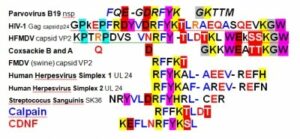|
Capetown, South Africa, 22-24 July 2009 “Positifs” n’a pu être present physiquement”à cette conference, faute de moyens financiers. Un abstract en présentation CD a cependant été retenu (CDA009) et nous la présentons in extenso dans cet article. Pour une excellente synthèse objective, mais où l’information off que Positifs rapporte systématiquement n’apparait pas, nous vous conseillons de consulter: http://www.nam.org.uk/cms1290216.aspx . Parmi les points que nous pouvons souligner:
Monothérapie au darunavir/ritonavir possible. Atanazavir boosté ou non boosté presentent la meme efficacité. L’aciclovir reduit les risques de progression de la maladie et le taux de mortalité. Enfin rien de vraiment nouveau sur les vaccins et l’éradication par accès aux reservoirs.
Communication de “Positifs” Molecular mimicry between aphthous diseases viruses: HIV-1 Gag p24, Human Foot-and-Mouth Disease Virus (HMFDV) and Parvovirus B19 (Behcet’s disease) centred on a hexapeptide VDRFYK. Thalidomide mechanism of action on Gag. Tran M.K.G. 1*, Caprani A. 2*, Gerbaud L.1 1 University Auvergne. Public Health (Pr Gerbaud L.), Hospital Hotel Dieu, Clermont-Ferrand, France. E-mail : mkg_tran@yahoo.fr
BACKGROUND Thalidomide is used in AIDS aphthous ulcers (Jacobson J.M., 1999) and Behcet’s bipolar aphthous disease, but the link between the 2 diseases is not clear. After the outbreak of cattle mouth-and-foot disease in France and Great-Britain, we tried to prevent for the future such a catastrophe for agricultural economics by studying a vaccine containing a critical epitope. In Behcet’s disease, Parvovirus B19 was found in 15, 7% cases versus 0% in controls (p = 0, 03) (Kiraz S., 1996). Parvovirus B19 DNA was detected by polymerase chain reaction in the lesional skin of Behçet’s disease (Baskan E.B., 2007). Streptococcus Sanguinis and human herpesvirus simplex have also been implicated in Behcet’s disease (Suzuki Kurokawa M., 2004). We try to understand the mechanism of aphthous ulcer formation in AIDS, Behcet’s disease and cattle mouth-and-foot disease.
METHODS We analyse amino acid sequences of Parvovirus B19, HIV-1 (Los Alamos databanks), Coxsackieviruses A and B/Human Foot-and-Mouth Disease Virus (HFMDV), Streptococcus and human herpesvirus simplex 1 and 2. Parvovirus B19 non structural protein (nsp) amino acid sequence was read from the COOH-terminus to the NH2-terminus (in retro-inverso sense, in Italics).
RESULTS There is a molecular homology (VDRFYKTL, 8 residues) between HIV-1 gag p24 and HFMDV capsid VP2 (VNRFYTL) (one gap), which is significant: There is roughly only 1 chance out of 208 (20 x 20 x 20 x 20 x 20 x 20 x 20 x 20) that this occurs by simple chance. Interestingly, a Streptococcus Sanguinis SK36 [gbABN43890] (Xu P., 2007) transcriptional regulator AcrR (and TetR family) has almost the same sequence 119-YVLDRFYHRLCER-131 than HIV-1 Gag YVDRFYKTLRAEQ. Similarly, Human Herpesvirus simplex-1 UL 24 [ACM622246] sequence RFYKALAEEVREFH is similar to HIV-1 Gag RFYKTLRAEQASQEVK:
We looked for a human sequence similar to these pathogen epitopes by BLASTP and found a sequence 687-RFFKTLDT-694 in the COOH-terminus of Calpain, which is activated by Epidermal Growth Factor (EGF) and induced apoptosis of keratinocytes (Inoue A., 2004): Perhaps this may be relevant to aphthous ulcers formation mechanism. Calpain is also implicated in thrombosis formation (Kulkarni S., 2004), which may be correlated to thrombosis in Behcet’s disease. We found also a very significant homology with Conserved Dopamine Neurotropic Factor (CDNF) [or Arginine-rich mutated in early tumor-like 1 (ARMETL1)] sequence KEFLNRFYKSL: In neuro-Behcet, a schizophrenia-like clinical picture was described by Nkam I. (2006), and schizophrenia is dopamine-related. There is a higher HIV infection rate in schizophrenia patients (Koen L., 2007). Schizophrenia and dopamine receptor type 2 In schizophrenia, anti-psychotics whether new or old target dopamine transmission. Dopamine receptor type 2 (DRD2) polymorphism is associated with schizophrenia (Corderio Q., 2009; Hanninen K., 2006). There is a striking molecular homology (Tran G.M.K., unpublished) between Influenza virus hemagglutinin 529-ILWISFTISCFLL-543 and DRD2 158-IVWVLSFTISCPLL-171, confirming Brown’s data about the role of Influenza virus in schizophrenia (Brown A.S., 2004) and the role of dopamine receptor type 2. We found also, in the same region, an homology of dopamin receptor type 2 sequence 160-WVLSFTISCPL-170 with Toxoplasma Gondii GT1 conserved hypothetical protein [gb EEE20189] 83-WLLSLFLVSCPL-94. Toxoplasmosis during pregnancy was also reported to produce schizophrenia in infants (Brown A.S., 2006; Henriquez S.A., 2009):
CONCLUSION Although the viruses and bacteria associated or inducing aphthous diseases were unrelated, at the molecular level, the mechanism seems the same. Thalidomide is probably efficient by a common mechanism in these various unrelated diseases. We found the aphthogenous motif VDRFYK in HIV-1 gag, and interestingly thalidomide and analogues in vitro reduces precisely Gag mRNA expression (Moreira A.L., 1997). Another interesting alternative and efficient treatment of aphthous ulcers is the grapefruit (Citrus maxima, Citrus grandis, Citrus paradisi) seed extracts (Heggers J.P., 2002), which has a bitter taste. Propolis from bee is also interesting (Samet N., 2007). Vitamin B12 is efficient (Volkov I., 2009). A vaccine against FMDV in cattle can be designed on this epitope to prevent future epidemics: It has the enormous commercial advantage to be recognized easily from infected cattles. A vaccine against HIV-1 must include this epitope presented by heat shock protein to dendritic cells (Srivastava P.K., 2009).
REFERENCES
|




Laisser un commentaire